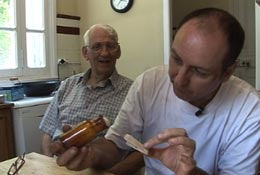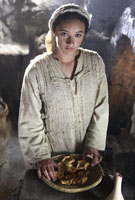 Here at Idol Chatter we often have to dig around through the pop culture items we cover to come up with a relevant religious, spiritual or ethical angle for our readers. It’s often a challenge!
Here at Idol Chatter we often have to dig around through the pop culture items we cover to come up with a relevant religious, spiritual or ethical angle for our readers. It’s often a challenge!
Case in point, I watched a movie that opened last Friday in Los Angeles (and opened a couple of weeks ago in New York) called “Bloodline” which follows a team of documentary filmmakers as they investigate whether Jesus of Nazareth married Mary of Magdala and had children, thus creating a royal bloodline, and whether that lineage made its way to Rennes-le-Château in Southern France from the Middle East almost two millennia ago. With a synopsis like that, I’m taking the rest of the day off!
If this reminds you of Dan Brown’s phenomenally successful “The Da Vinci Code” you’re right on track. Both Brown and Bruce Burgess, the director of this compelling film, were struck by the ideas put forth in the 1982 bestseller “Holy Blood, Holy Grail,” which claimed that a secret society called the Priory of Sion was created to protect the assets, foremost the secret of such a royal lineage courtesy of Jesus and Mary, from the Catholic Church and, by default, the masses at large.
Have these leave-no-(literal)-stone-unturned filmmakers found undeniable proof of the greatest cover-up of all time? Is that mummified female corpse “of unique Middle Eastern heritage” that they discovered in a tomb in France actually Mary Magdalene or one of her children?
The answers to these questions, if found to be true, could rewrite history and crack the very foundation of one of the world’s great monotheistic traditions. Of course, this latest addition to the Indiana Jones-esque saga, three years in the making, is only but a very small piece of the overall puzzle. As a thought-provoking documentary and a great example of cinéma vérité, “Bloodline” is a fascinating film that dares to ask the questions whose answers unsettle so many.
The movie itself gets a little bogged down in the details (names, dates, innuendo, etc.) of the “bloodline conspiracy” (as it’s been called), but I found the press notes of great benefit when trying to piece it all together for a review. Readers can check out the film’s extensive website for similar, helpful information. For all of the film’s painstaking effort for authenticity, however, I admit that I was enraptured when it turned into a mystery/thriller as the filmmakers started uncovering ancient clues left in bottles in the hills of Rennes-le-Château.
When a camera is passed down into an unreachable burial chamber (by Ben Hammott) and, after a little rooting around, a mummified face appears on the screen which has the potential of being that of Mary Magdalene, my brain flooded with electricity, feeling like I might be witnessing history. It reminded me of how Howard Carter must have felt when his team stumbled upon the tomb of Tutankhamun in the Valley of the Kings in 1922, the only difference being that these images may be pieces of a puzzle that could shatter Christian theology and Christianity itself as we’ve come to know it!
Admittedly, I am very skeptical when it comes to Biblical archaeology, as anyone should be, so there was always the question in the back of my mind of whether this could be a hoax on the filmmakers’ part à la “The Blair Witch Project” or one orchestrated by the Priory of Sion to send the documentarians on a wild goose chase. In any event, it’s extremely compelling cinema for where it takes the human imagination.
Personally, my own spiritual life will not teeter if it’s ever proven that Jesus married and/or fathered children with Mary Magdalene (endlessly proven by scholars now not to have been a prostitute) or with anyone else, for that matter. I’m fascinated by the historical aspect of it and simply hope that the truth of the “bloodline conspiracy” will one day be revealed, be it a red herring or one that may well alter the world psyche.
The movie’s tag line reads:
What if the greatest story ever told was a lie?
I don’t think much would change if the scientific community signed off on new evidence supporting the idea of a Christian bloodline. Religious belief by its definition has little to do with scientific, rational reasoning so it’s hard for me to picture a post-discovery world where everyone falls in line with such conclusions. At the end of the day, I think we’d just have more Christian denominations for sociologists to count in their surveys.
I hope the French government is sincere in its talks of a full-scale excavation of this burial tomb in Rennes-le-Château. After all, if Bruce Burgess and company have, indeed, stumbled upon the mummified remains of Miss or Mrs. Mary of Magdala, don’t we honor her best by revealing the historical truth of her life?


